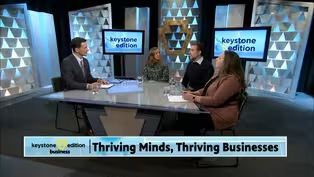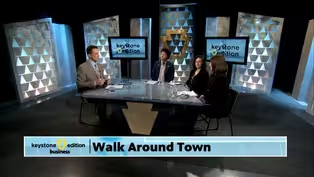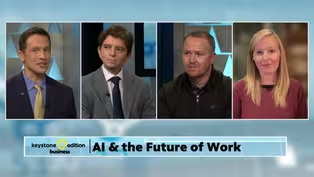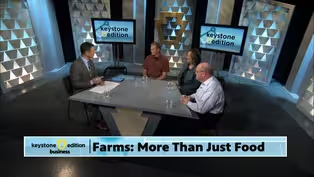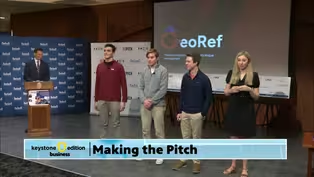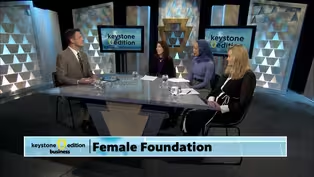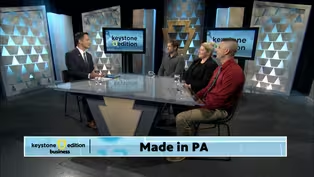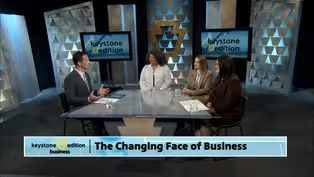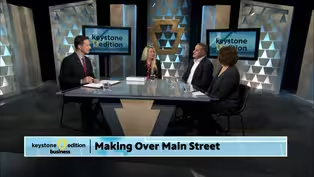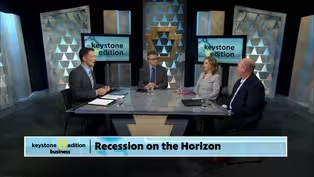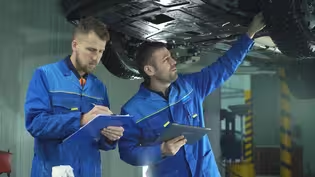Keystone Edition
Trading Up
2/11/2021 | 27mVideo has Closed Captions
Find out what jobs are in demand in our area and how you can get the training you need
Skilled trades workers are becoming more and more in demand. Older workers are retiring, and there’s a lack of younger workers to take their places. A skilled trade is one way to get a higher salary, with not as much formal schooling and less student debt. Some schools offer distance learning in trades like electrician or plumbing.
Problems playing video? | Closed Captioning Feedback
Problems playing video? | Closed Captioning Feedback
Keystone Edition is a local public television program presented by WVIA
Keystone Edition
Trading Up
2/11/2021 | 27mVideo has Closed Captions
Skilled trades workers are becoming more and more in demand. Older workers are retiring, and there’s a lack of younger workers to take their places. A skilled trade is one way to get a higher salary, with not as much formal schooling and less student debt. Some schools offer distance learning in trades like electrician or plumbing.
Problems playing video? | Closed Captioning Feedback
How to Watch Keystone Edition
Keystone Edition is available to stream on pbs.org and the free PBS App, available on iPhone, Apple TV, Android TV, Android smartphones, Amazon Fire TV, Amazon Fire Tablet, Roku, Samsung Smart TV, and Vizio.
Providing Support for PBS.org
Learn Moreabout PBS online sponsorshipMore from This Collection
Steve Stumbris will talk with entrepreneurs, executives, and creators to get their insight on what it takes to make it in today’s modern marketplace, examining an array of topics including workforce development, professional development and regional commerce.
Thriving Minds, Thriving Businesses
Video has Closed Captions
Success isn't just about the bottom line – it's about the well-being of those who drive it (27m)
Celebrating Black-Owned Businesses
Video has Closed Captions
We'll examine the challenges the Black business community faces (26m 59s)
Video has Closed Captions
Many long-standing businesses have been in families for generations. (26m 59s)
Video has Closed Captions
What impact does improving a community's walkability and bikeability have? (26m 59s)
Video has Closed Captions
How can businesses leverage this new technology responsibly without costing jobs? (26m 58s)
Video has Closed Captions
Keystone Edition Business dives into agritourism and what it means to be a modern farmer (26m 59s)
Video has Closed Captions
Check out a program that may help some students get their ventures off the ground (54m 59s)
Video has Closed Captions
Keystone Edition Business delves into the challenges facing women in the workplace (27m)
Video has Closed Captions
Keystone Edition Business profiles some locally-owned and homegrown ventures. (26m 59s)
Video has Closed Captions
See immigrant-led businesses in our area, what it takes to get there, available resources (26m 59s)
Video has Closed Captions
Find out what business owners are doing to reinvigorate and reinvent downtown shopping (26m 59s)
Video has Closed Captions
What constitutes a recession? What are the contributing factors? How does it affect you ? (26m 45s)
Providing Support for PBS.org
Learn Moreabout PBS online sponsorship- [Voiceover] Live from your Public Media Studios, WVIA presents, Keystone Edition Business.
A public affairs program that goes beyond the headlines to address issues in Northeastern and Central Pennsylvania.
This is Keystone Edition Business.
And now, moderator Kris Jones.
- Welcome to Keystone Edition, I'm your host, Kris Jones.
At one time most people thought the only way to a secure financial future was a four year degree from a college or university.
That's not necessarily the case, and as many people know, a bachelor's degree doesn't always guarantee a job.
However, there are several fields where positions are opening faster than they can be filled.
Some positions like an electrician or a plumber don't necessarily need a four-year degree and have various on-the-job opportunities available.
Nursing is another field where there's a high demand for workers.
While the nursing field may need more education, there's also high earning potential.
So what can you do if you're looking to start or change a career?
We have experts here to help.
You can reach out by phone at 1-800-326-9842.
Email at keystone@wvia.org or on social with the #keystonebusiness, but first WVIA's Paul Lazar takes a look at which careers are in demand right now and why.
- [Paul] With two recessions in the past 15 years, more and more job seekers are looking to find opportunities in stable careers.
A four year degree doesn't always guarantee success and alternative paths to secure a sound financial future are becoming more appealing.
The Bureau of Labor Statistics estimates there will be nearly 300,000 new construction jobs over the next eight years.
That includes plumbers, electricians and carpenters.
The concern is that there may not be enough workers to fill those jobs.
Part of the reason is the large number of baby boomers that are retiring, and another part is the emphasis on going to a four year college or university.
With a skilled trade such as electrician or plumber, many students can start apprenticeships in high school and learn while getting paid.
The US Department of Labor estimates that the average starting wage for an apprentice is $15 an hour, and the average salary for someone who completes an apprenticeship is $50,000 annually.
Many apprenticeship sponsors team up with colleges and universities so the students can earn college credits while completing their apprenticeship.
Another area of growth is the nursing field.
The Bureau of Labor Statistics projects that nursing jobs will grow faster than all other occupations over the next five years.
An aging population combined with an aging workforce are contributing to this nursing deficit.
Several schools in Northeastern and central Pennsylvania offer nursing programs in all education levels, from an associate's degree through a doctorate, and programs are being implemented to help open up the pathways to becoming a nurse.
You can find that information at wvia.org.
For Keystone Edition Business, I'm Paul Lazar.
- Now we just need to hear from you.
Give us a call at 1-800-326-9842 to learn more about the future of workforce development.
First, joining us here in the studio is Dr. Annette Weiss.
Assistant Dean of Nursing and Chief Nurse Administrator at Misericordia University.
On Zoom, we have Shannon Munro, the vice president of Workforce Development at the Pennsylvania College of Technology in Williamsport.
And Sara Maaske, the senior director of product at Penn Foster, an online school with offices in Scranton.
Dr. Weiss, welcome to the WVIA studio.
- Thank you.
- I'm really, really honored to have you here.
Misericordia is such an amazing university with so many resources to help educate in health sciences.
Your role at the university is in the nursing program.
Can you tell us a little bit more about that role and some of the highlights of the programs that Misericordia offers to train the future nurses of Northeastern and Central Pennsylvania?
- Absolutely, Kris.
Thank you.
My role oversees all of our nursing programs, which are both at the undergraduate and graduate levels, all the way up to the doctor of nursing practice.
I spend my days overseeing some of the different staff, the faculty, looking at what the needs are in our community and determining what new programs should exist, or have the potential to exist.
We have different programs that we just opened last year in Pittsburgh.
So we have a brand new ABSN program.
Our first graduating class just happened in December.
So that's a program for typically more adult students or students who already have at least 60 college credits.
They also could be second degree.
So they might've been an accountant and have decided that maybe that's not the career for them any longer, and so they enter into our ABSM program and, you know, go toward that second career.
We have a similar one on our Dallas campus, which is our evening program, who also tend to be older students who work during the day and then at night have the opportunity to take classes and to have clinical and lab sessions at night.
Runs all the way through our traditional undergraduates and up to our graduate students.
We educate advanced practice nurses, family nurse practitioners, adult-gero nurse practitioners, and we're looking at some new programs there, all the way up to the doctor of nursing practice, who are clinical nurse experts.
- So, you know, one of the premises of this show is that you don't necessarily need a four-year degree.
Now, in the case of a professional registered nurse, you do.
Can you talk a little bit about how much time is dedicated to that?
And if there are other nursing opportunities that only require maybe a high school diploma or a two-year degree.
Can you talk a little bit more about these opportunities?
- Certainly.
So you can be in the healthcare field out of high school, you can work as a nursing assistant.
That's where I started when I was 18 years old, working in an assisted living facility.
You can do that without any further education.
It's usually more on the job training, learning how to take care of people.
You can become a certified nurse assistant, you can become a medical assistant, all which require less training, but still lead to a certification.
You can be a licensed practical nurse, an LPN.
Our friends at the vo-tech have a great program there for licensed practical nurses.
You can enter into nursing through a community college with an associate degree, you can go to a diploma school and have a three-year degree or you can start into a bachelor program and do the four year path.
- One of the things that Misericordia is known for is really the strength of its health sciences programs.
And really in preparing for the show, I kind of discovered that there are a lot of health sciences jobs that might overlap with nursing.
Can you speak to what might be an opportunity for some of those types of students to trade up and to move up to that registered nurse position?
So are there anything about your curriculum or the clinical practices that you offer that could get them sort of hands-on training that could move them into sort of higher salaried positions?
- Sure.
So we personally have a program in our evening program where there's a lot of licensed practical nurses, so LPNs.
We have a bridge program where there are a few classes that they don't necessarily have to take if they're practicing LPN, and that helps get them a little further along to be able to complete the program a little bit quicker.
The goal of nursing over the last several years has... Or decades even, has been seamless transition.
So in the ideal world, we would be able to take a medical assistant, move them into role as an LPN or into an RN program and then get them up to maybe perhaps an RN to BSN program where they finish that degree.
- And the final thing I just wanna say before we move on to Shannon is, you know, this is the most in demand career opportunity.
What could you say to viewers that are listening encouraging them to take the step to become a nurse, to fill that void where the demand is?
- Sure.
You either love it or you hate it, and people are either drawn to it because they're passionate about working with other people, and if you feel that that's where you wanna be, if you wanna care for people and work with people, help people recover as best as they can, it's a great career.
There are so many paths, there are so many jobs.
You don't necessarily have to be in a hospital working, nurses are all over, they're in our schools, they're in offices, they're in hospitals, they do research, they're in education.
So there are just so many opportunities that once you become a nurse, it really is the key to opening so many different paths.
- Excellent.
Thank you.
Let's talk a little bit more about trade jobs.
Shannon you're at the Pennsylvania College of Technology.
Can you share a little bit more about how your school is helping prepare people to get high paying trade jobs?
- Certainly.
Thank you very much for the opportunity.
Penn College is located in Williamsport, and we offer certificate, associates and bachelor degree programs that align with in demand occupations in a number of sectors, including nursing and health sciences, but also in engineering technology, which can lead to a multitude of career opportunities.
Even during the pandemic, employers continue to hire our graduates often before they're even finished with their education.
We are known for hands-on education.
Our students learn by doing, by applying their skills and laboratories, and we have very strong employer connections.
Through the Workforce Development Department where I work, we partner with companies who need training for their existing workforce.
So if you step back a bit, we go about solving the skills gap problem at Penn College from multiple directions.
Graduating students that have the skills that are needed in the workforce when they complete, but also helping companies who are continuously needing to train their current workforce because the climate is constantly changing.
We're very fortunate in that, we were selected to receive one of 23 US Department of Labor grants that was awarded across the country to scale apprenticeship programs.
The one that we received we call MIDAS.
It was funded at $8 million and it focuses on advanced manufacturing.
So it allows us to support companies efforts to train their existing workforce in areas like CNC, mechatronics, industrial and manufacturing technician or plastics process technician are some of the examples.
And those programs are usually one to four years in length.
We're currently working with about 30 companies in Pennsylvania and across the United States, like First Quality and West Pharmaceutical Services, who are just two of the companies that have invested in their employees so that they can have the skills necessary to both efficiently and effectively make their company's products.
And we're always looking for other employers that might be interested in apprenticeship as a strategy for training their current workforce.
- It's super interesting.
And we're gonna get to apprenticeship in just a moment, but in the same way that when I was just chatting with Dr. Weiss about the importance of filling the demand for nursing, what are the top two or three high paying trade jobs that appear most in demand right now?
- We hear from companies on a regular basis about needs in the machining, CNC areas, PLC skill sets, because many of these companies are investing heavily in automation, which many people feel that that means that there will be less jobs, but it really means that there will be different jobs and more high skilled jobs that take the place of things that may have been repetitive or difficult in a facility.
So jobs around automation, robotics, PLC, which is programmable logic control, we have a high need in the plastics area around plastics process technician.
Those tend to, I think, bubble to the top right now for us.
- Perfect.
So apprenticeships.
Tell us more about how the Pennsylvania College of Technology is leveraging apprenticeships and partnerships with businesses to train sort of on the job, you know, future mechanics or carpenters or electricians or plumbers.
- Okay.
So apprenticeship is broken into a couple of different pieces.
At Penn College, I mentioned that we do a lot of hands-on training on our campus, but with apprenticeship programs, the individuals do the hands-on training at the company.
So they are actually working at the company and learning next to an individual that is a subject matter expert in that particular skillset.
In addition to that, on the job training piece, they're also required as part of an apprenticeship program to also receive classroom instruction.
And this is a full-time investment for the individual that's going through these programs.
Penn College provides the support for the classroom instruction piece, which is usually the equivalent of about 144 hours a year, and we do those programs in four hour blocks.
We help companies considerably, especially in rural areas in Pennsylvania, because we're able to have companies come together for a consortium model.
So they might not have 20 people in a single company that need training in a mechatronics area, but there may be five companies that each need a few of their people trained that can come together into a single classroom, which we deliver remotely, and the instructor is live, so any of the individuals in the class are able to interact directly with that instructor and be able to get the support they need to learn a particular skill set.
So essentially, they're doing the how on the job and then we are teaching them the why, so why they do the things that they do and the theory behind that.
- That's great.
For the viewers that are watching, you could go to wvia.org for a list of resources.
We're using lots of acronyms, and these are acronyms that, you know, you might not know what they mean, but go to wvia.org and will get more information there.
Before we go to Sara, you did mention some of your partners, but can you mention two or three companies in the Northeastern, Central Pennsylvania area that have active apprenticeship programs and are looking to hire?
- Yes, we work very closely with West Pharmaceutical Services.
They have facilities in multiple states, but they locally have facilities in Jersey Shore and Williamsport.
That is a company that we've worked with for many years, both on the apprenticeship side, but they also hire our graduates into many of their open positions.
And the other company that we've been working very closely with over the years is First Quality, which also has locations in multiple states, and we are in particular working with three of their facilities in Pennsylvania in McElhattan, Lewistown and Lock Haven.
- Shannon, thank you so much.
Sara, let's move on to you.
So you're with Penn Foster.
Tell us more about how your school is helping to prepare the workforce for high paying trade jobs.
- Yes.
Thank you and thank you for having me.
So if you haven't heard of Penn Foster, we have a rich, rich history of supporting the trades, going back to the 1890s.
As you mentioned at the beginning, we are founded and based out of Scranton, Pennsylvania, and actually our founder developed curriculum for training for coal miners.
So we are very passionate about the trades, that's where our background is, and it's really our mission to provide accessible and affordable education for all and prepare people for today's in demand jobs.
And so we do that by, we're after a number of different trading programs in high demand occupations, in the manufacturing, energy and construction industries.
My role and what we do at Penn Foster is we're really trying hard to make sure that we are staying relevant in the skills that we're teaching individuals.
So for concrete example, you mentioned, you know, electrician at the beginning, at the intro.
If somebody is looking for, you know, how do I become an electrician or what are the skills needed to be an electrician in the residential construction field?
We will actually work to ensure that we're successfully teaching those skills and making sure they align to industry credentials and job descriptions, so they are more prepared and likely to get hired after they've completed our program.
- One of the things that I find unique about Penn Foster, if I'm not mistaken, is that you are fully remote.
Is that correct?
Does that kind of distinguish you in this space?
- Yes, we are all online, correct.
- And so I see that as an opportunity, particularly in this new distributed workforce, where people are looking to take advantage of some of the downtime that they have right now.
Is there anything that makes your curriculum more in demand than say more of a traditional school environment?
So in other words, are you training certain in-demand jobs at a quicker, more efficient pace than say, more traditional schools?
So is there anything you could leverage about being remote other than the fact that, I think that's really in demand right now to help kind of solve that problem of so many jobs available and not enough people with the skills to fill those jobs?
- Yeah, absolutely.
I think there are a lot of benefits to turn into an online program.
You know, what we hear from our students and why people come to Penn Foster is because they're often working one or two jobs, or their shift jobs.
They don't follow a traditional nine to five schedule.
What we say is we work with the working adult learner, that's where we specialize.
So you're talking about people that have families and personal schedules, and it makes it very difficult to commit to, you know, going to a brick and mortar institution at the same time each week, and therefore, especially during a pandemic, you get a lot of learners that turn to an online option because it offers the flexibility of a self-paced model to learn at their own pace.
It also offers a lot more affordability than a traditional brick and mortar.
- Sara speak quickly about apprenticeships, right?
So Penn Foster does offer apprenticeships.
What do they look like at Penn Foster?
- Yeah, and it's very similar to the Penn College, what Shannon had outlined as well.
So we actually partner with a lot of employers across the US, and like she said, there are multiple parts of apprenticeship.
Obviously, you need the employer to sponsor the apprenticeship, to provide the on-the-job training hours.
They actually study under a skilled trades person, an experienced skilled trades person.
And they turn to Penn Foster then to provide the education of the curriculum.
And so during the day, they would work their traditional, you know, schedule, they would train with their mentor, they would learn the hands-on skills.
So they're learning, you know, what to do or how to do it, and then at night they go to Penn Foster, or whenever they have time, they would take our curriculum at the same time as their apprenticeship, and they learn the why they're doing the things.
And so at night they might read a chapter on print reading and the next day they would go through and apply it on the job.
- Can you tell us a little bit about some of the partners that you might have at Penn Foster.
Shannon had shared some of them from Penn College, but how about mentioning a couple of the partners, particularly those that are hiring high paying trade jobs?
- (chuckles) Yeah, I was actually looking, it was interesting because I was looking to see how many apprenticeship opportunities there were in the state of Pennsylvania.
We work with a lot of great organizations like Penske across the country, and so I would actually recommend that people go to apprenticeship.gov.
There is a lot...
They've actually a pretty cool job finder opportunity there, where you actually go and find local opportunities for you if you are interested in apprenticeships.
- Thank you so much, Sara.
Dr. Weiss, we'll come back to you.
So in sort of prep for this, you had talked about your clinicals and how important those are to your nursing students.
Can you share a little bit more with the viewers about what a clinical looks like for a nursing student?
- Sure.
Our nursing students get into their first nursing course in their second year.
So the tradition of two years of all the core courses is kind of over.
We like to touch a little bit on nursing in the beginning of their sophomore year.
Their first real clinical experience is in the second semester of their sophomore year.
We have a great facility up on campus where we have the Mercy Center and our students are able to go interact with the patients there and learn some basic skills and just get their feet wet.
In their junior and senior years, we have various experiences in the Geisinger System, Commonwealth Health System, our Pittsburgh students go out to Allegheny Health.
So we're in all the major health systems across the state, and our students get the experience of two days a week of clinical.
They also are able to be in our lab, where they can practice and make mistakes, and learn from their mistakes in a very safe environment.
We have a great simulation room where the students really interact with a mannequin that can cry and the mannequin can sweat and do all the things a person can do, and so it's a really safe environment for them to be able to learn in and then go into the clinical setting and actually do that with real patients.
- Yeah, I know.
I know as a student, former student, not nursing, but I love those internships and externships where you really kind of get, you know, the experience of what it might feel like to have a real job.
Shannon, this is actually a question from Facebook.
What are the qualifications, who would be a good fit for the trades?
- So in talking to you earlier, we talked about the individual from West company that came through our apprenticeship program here and is still in it.
So companies are primarily in the driver's seat of apprenticeship programs.
They're the ones that have to look at their individuals that are working for them.
I would say that I would pay attention to those people that are really interested in learning and interested in helping their coworkers, interested in making the company a better company to work for, and in general, somebody that has a level of sticktoitiveness and will complete a program because it's not a simple program to go through.
Many of these apprenticeship opportunities, you have to have a strong work ethic and be the person that shows up.
- And Sara, do you have any additional comments you'd like to make on that?
- Yeah, and I think Shannon had laid a great baseline, but I think anybody likes working with their hands.
They, you know, doesn't wanna sit around at a desk all day, enjoys tackling different projects or challenges.
I think that that's really somebody that would do well in the trades.
I would say that the trades don't often require a high school diploma.
Sometimes employers do, but you can go on and get a trade specific.
You can get a certificate or diploma program at an education company like Penn Foster or Penn College, which is less than a year and doesn't require a high school diploma sometimes.
I would also just say that the trades are changing, it's very different than what you might think of somebody back in the 50s.
I think it's becoming much more diverse.
We're starting to see a lot more focus put on diversity and inclusion in apprenticeships.
And based on enrollment trends that we're seeing at Penn Foster, the Department of Labor's renewed emphasis on diversity and inclusion, and through organizations like IJFFs, IDAM project, you see a lot more employers really focusing on recruiting and hiring women and minority.
So I would say for anybody out there that's interested, I would highly encourage you to just really seek out the opportunities that are available.
- Yeah.
No, that's great.
And I just wanna let the viewers know that we went ahead in the reference that you made to the apprenticeship website.
We went ahead and added that to the wvia.org site.
The final question is for you and we have about 30 seconds.
What is the easiest way for people to get more information about the nursing programs at Misericordia?
- Definitely our website.
You can go to misericordia.edu.
All the information on all of our programs for undergrad through graduate is there for you to look at.
I'm happy to answer emails.
All of our faculty are very warm and friendly and happy to answer any questions anyone has.
All of our names, email addresses and phone numbers are on the website.
- Having served on the Board of Trustees for 12 years at Misericordia and having spent so much time with the Sisters of Mercy, it's been really a pleasure to have you and the other guests on the show.
I'd like to thank our panelists for participating and thank you for joining us.
For more information on this topic, please visit wvia.org.
And remember, you can rewatch this episode or any previous episode on demand any time online or on the WVIA app.
For Keystone Edition, I'm Kris Jones.
Thank you for watching.
(upbeat music)
Providing Support for PBS.org
Learn Moreabout PBS online sponsorship
- News and Public Affairs

Top journalists deliver compelling original analysis of the hour's headlines.

- News and Public Affairs

FRONTLINE is investigative journalism that questions, explains and changes our world.












Support for PBS provided by:
Keystone Edition is a local public television program presented by WVIA
